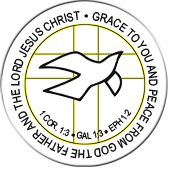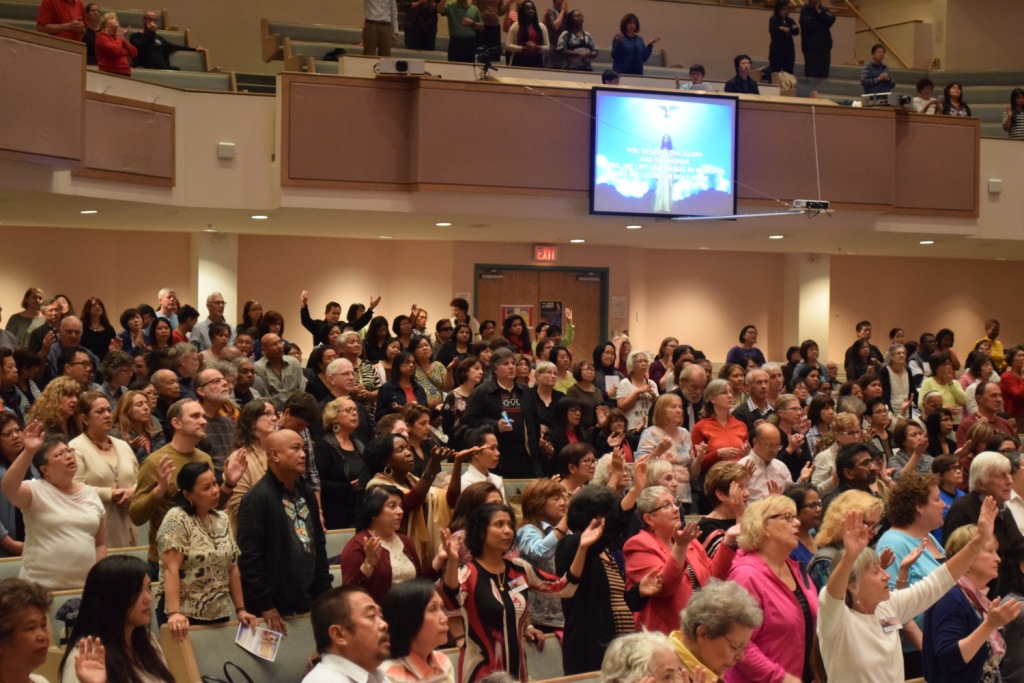Vancouver Catholic Charismatic Conference 2016
By RICHARD DUNSTAN
How do we know God is merciful? Well, for one thing, because the world still exists.
If G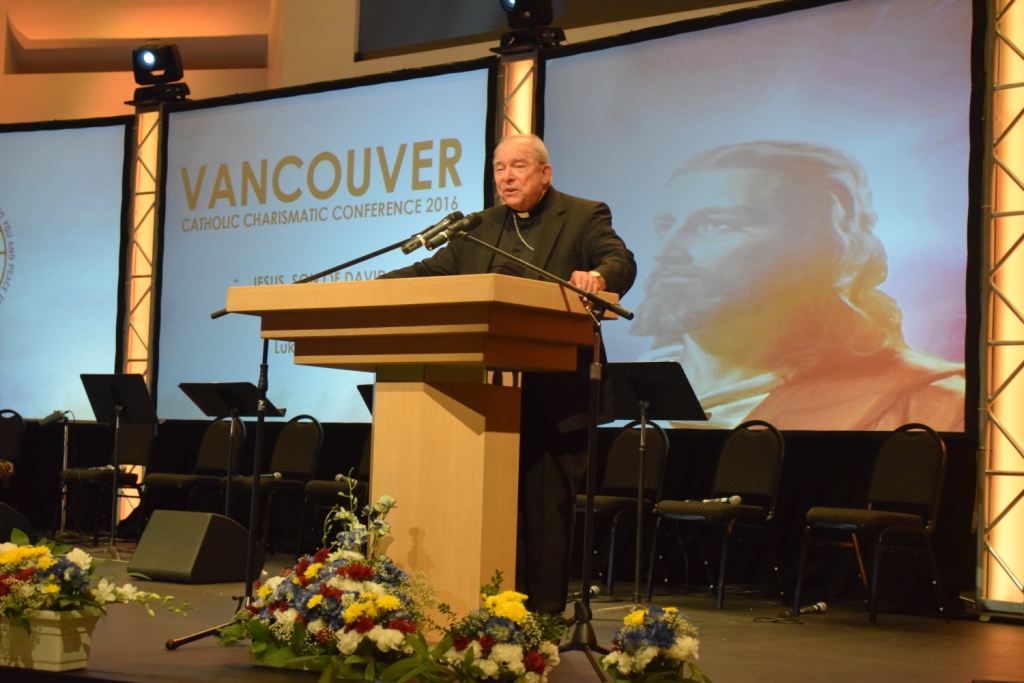 od hadn’t forgiven our sins, His justice would have annihilated the world, Bishop Sam Jacobs told the provincial Catholic charismatic conference in Vancouver. But God has given us mercy instead of justice.
od hadn’t forgiven our sins, His justice would have annihilated the world, Bishop Sam Jacobs told the provincial Catholic charismatic conference in Vancouver. But God has given us mercy instead of justice.
“He gave us what we don’t deserve, and that is forgiveness, that is healing, that is mercy,” Bishop Jacobs said. “What God does not give us is justice, because if He gave us justice, none of us would have a chance.
“All is mercy, because we deserve none of the gifts God gives us.”
Bishop Jacobs, of Louisiana, chair of the U.S. national service committee for the Catholic charismatic renewal, and Dr. Margarett Schlientz, of Wisconsin, whose ministry combines theology and psychiatry, were featured speakers at the conference, jointly sponsored by Catholic Charismatic Renewal Services of B.C. and Vancouver Catholic Charismatic Renewal Services. More than 1,100 attended.
The conference returned to Broadway Church, a Pentecostal church approved for Catholic events, after three years in other locations.
Bishop Jacobs said God is like the father in the parable of the Prodigal Son (Luke 15:11-32), which he said should really be called the parable of the foolish father, because the father’s generosity goes far beyond common sense. He accepts the insult of his son effectively wishing him dead, by claiming his inheritance early; then he spends his time waiting for him to come back from throwing the inheritance away on a life of sin, runs to him and kisses him, and throws a feast for him. So there’s no reason for us to stay away from confession for years, the way some fallen-away Catholics do.
“The Father is waiting with open arms for you to come back. Why are you waiting? No matter how far we feel from God, the Father is waiting. All we have to do is pronounce that word from the heart—‘Father, I need You—and He’ll forgive you, no matter what you’ve done.”
Of course, we’re supposed to do something with that mercy we’ve received. We’re supposed to pass it on. If we refuse, we’re refusing God’s mercy for ourselves as well.
“God does not show mercy and healing to those who are in rebellion, to those who refuse to show mercy for others,” Bishop Jacobs said. “God doesn’t refuse us His mercy—we refuse to accept His mercy. We want mercy on our terms—we have to receive it on His terms. To the extent you are open to mercy for others, to that extent you receive mercy from God.”
God’s mercy begins in baptism, Bishop Jacobs said; we are born alienated from God, and in baptism we are united with Him. Mercy continues in the Eucharist, in the sacrament of reconciliation, and in the anointing of the sick.
If we don’t approach it as wholeheartedly as we should, he said, confession can be like cutting weeds—the weeds will grow back again. We need to give God permission to uproot our sins, and when we go to confession we should ask the priest to pray that God will heal us in the core of our sins.
The liturgy of the Eucharist contains many references to mercy, he said: “Lord have mercy” at the beginning, and “Lamb of God, You take away the sins of the world, have mercy on us,” and “speak but the word and my soul will be healed” just before Communion. “We need to step out and expect that God is going to do mighty deeds in our lives because of the Eucharist.”
As for anointing of the sick, we can look for healing there too. “It’s not the sacrament of the dying, it’s not the last rites, it’s the sacrament of the healing of the sick,” he said. His own dentist was diagnosed with a brain tumour the size of a grapefruit; he would die without surgery and might die, or be left in a vegetative state, even with surgery. He received the anointing of the sick, and prayer, and the surgeon found only a pea-sized tumour that did not penetrate the brain.
The bishop noted, though, that the ultimate healing is sometimes death. God may want us with Him in eternity, where there will be no more suffering. “He’s God, and we’re not.”
Bishop Jacobs said Mary is the Mother of Mercy: prepared from the moment of her conception to be the mother of the Saviour, “she literally brought the Divine Mercy to birth in the world: mercy incarnate, Jesus Christ. Her motherhood of us all was sealed at the foot of the Cross, and after her assumption into heaven she continues to come to our aid.
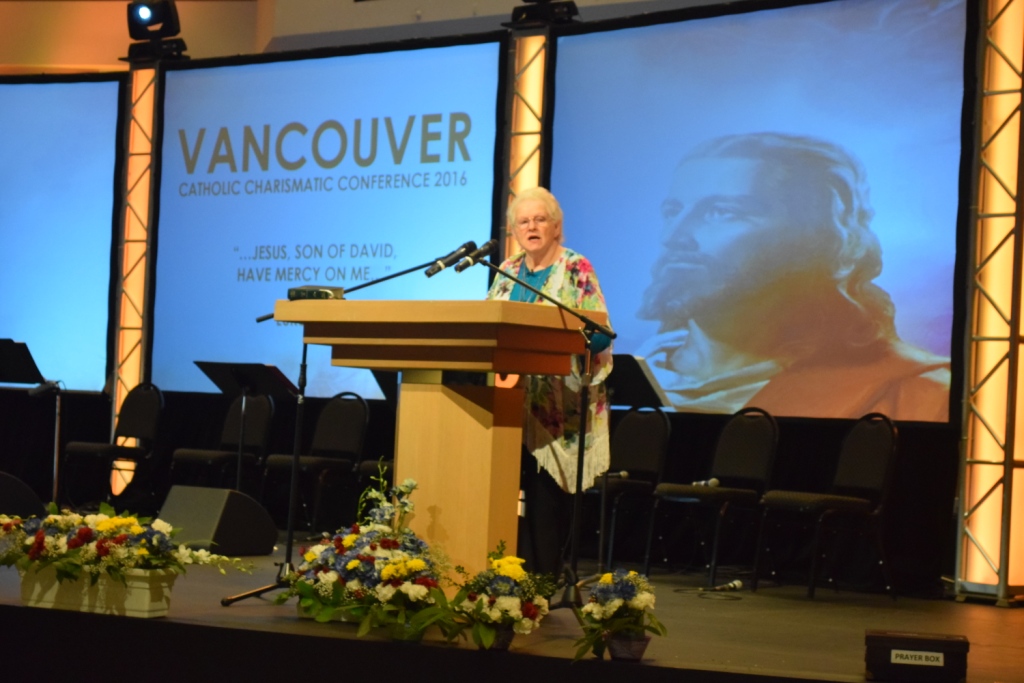 Dr. Schlientz also stressed the Eucharist – and the need to show mercy to others.
Dr. Schlientz also stressed the Eucharist – and the need to show mercy to others.
Noting that there are 70 million ex-Catholics in the United States alone, she said the Eucharist “is the greatest miracle, and we have it right in our hands. It’s the cure for everything, and we walk by it as if it doesn’t exist.” She told of a priest who was healed of an addiction to pornography by spending one hour prostrate in front of the Blessed Sacrament, and she urged Massgoers not to bypass the chalice when receiving Communion. “Satan hates the Precious Blood,” she said. She told of a woman who was healed of Lyme disease by receiving from the chalice, and noted that the U.S. Centers for Disease Control and Prevention check chalices regularly for germs and have never found a dangerous organism.
But she, too, said we have to pass God’s mercy on by forgiving others. Too many people are still angry at somebody after receiving the Eucharist, as can be seen in any church parking lot.
“Something is wrong with this picture,” she said.
“Forgiveness is the hardest human task there is. People find hundreds of excuses not to do it.” She said we can’t forgive by our own efforts, but must ask for God’s help. “You can’t do it, but God can.”
Since we receive Jesus in the Eucharist, we must be Jesus to those we meet. “When people see you, do they see the Lord? Ask yourself this every evening in your examen [examination of conscience].”
“When Jesus came down from the mountain [following the Sermon on the Mount] the crowds were following Him (Matthew 8:1). They should be following us—right into the Church.’
She said we must pray for seminarians—whose numbers have increased dramatically in recent years—and for priests, and not criticize them. “They are instruments of God—they aren’t supposed to be perfect.” We must even pray for the people in ISIS, and love them as well. “I watch TV news because of the negativity,” she said. “It is our responsibility to pray for everyone who commits a criminal act.”
Dr. Schlientz also said we must pray for healing, of ourselves and others, and expect results. “We rely too much on ourselves. We’re all educated, and we think that’s enough.” She prays at every opportunity. For example, she once prayed in a fabric store, with a woman who was buying material for a turban—a fact that identified her as a cancer patient.
“Medical science has much to offer, but it will never replace healing prayer,” she said. “There are many places of affliction that medical science cannot touch.”
“Our problem is, our God is too small. We don’t ask enough. We don’t trust enough.
“We may pray for a lifetime [for a particular need]. God is always moving in some way. It may be delicate, it may be subtle, but it is not absent.”
Bishop Jacobs is retired bishop of Houma-Thibodaux in Louisiana and was previously bishop of Alexandria, Louisiana. Born in Mississippi but raised in Louisiana, he was ordained in 1964 for the diocese of Lafayette. He served there and in the diocese of St. Charles as parish priest and chaplain, as well as diocesan director of vocations and seminarians for St. Charles. He was named bishop in 1989. He was named to the national service committee in 1982 and served as chairman from 1987 to 1993; he returned to the committee in January 2015. He also chaired the committee for evangelization for the U.S. Conference of Catholic Bishops from 2005 to 2005, and is currently a member of the committees on laity, marriage, family life and youth, and on evangelization and catechesis. He retired as diocesan bishop in 2013 but continues to serve as a speaker, as well as operating the Spirit Aflame website, http://www.spiritaflame.org/ . He was featured speaker at the 2015 Our Lady of Pentecost Summer Institute in Kelowna.
He may be seen on YouTube at: http://www.bing.com/videos/search?q=youtube+bishop+sam+jacobs&qpvt=you+tube+bishop+sam+jacobs&FORM=VDRE.
Dr. Schlientz, a Wisconsin resident, holds a doctorate in psychiatric nursing and master’s degrees in theology, spirituality, and psychiatric nursing. She is the founder of the Pope Leo XIII Institute for the education of priests in exorcism and deliverance, and is assistant director of the Institute for Priestly Formation at Creighton University in Nebraska. She is co-author of the RISEN program (Re-Invest Spirituality and Ethics in the Networks of Health Care), and presents it regularly to health care systems across the U.S. She has held teaching and administrative posts at Marquette University in Milwaukee, speaks at conferences and parish missions, and ministers as a spiritual director to priests. Her website is https://drmargarettschlientz.com/. She is on YouTube at https://www.youtube.com/watch?v=yre6KPH7RJg.
ARCHIVE REPORTS
By RICHARD DUNSTAN
One of Father Richard McAlear’s favourite biblical characters is a donkey. It reminds him of where he stands in God’s scheme of things, especially in his healing ministry.
Remember Balaam in Numbers chapter 22? He was on a mission from God, but he got it messed up, and the donkey he was riding had to tell him off before he got it straightened out. Then Balaam spoke the word of God, bravely and truthfully.
“The Lord spoke to him through a donkey,” Father McAlear told the 2014 Vancouver Catholic Charismatic Conference. I find great consolation in that. We don’t need great education in [healing] techniques.
“We just need to have Jesus.”
Father McAlear, head of the Ministry of Hope and Healing, was a last-minute replacement for scheduled speaker Bob Canton at the conference at St. Matthew’s Church in Surrey. Canton, who leads a healing ministry based in Stockton, Calif., had to step down due to a family medical crisis.
“We just nee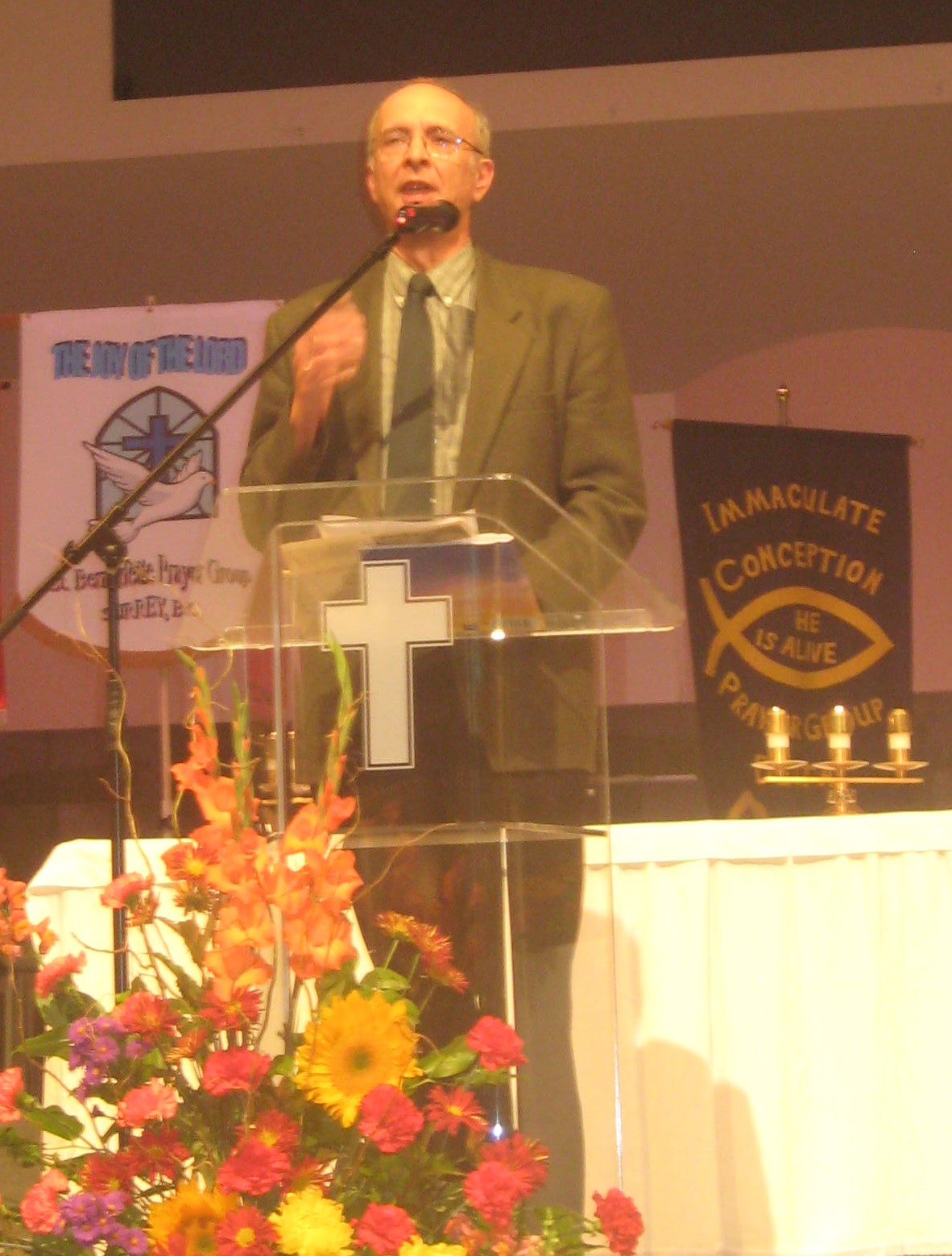 d to have Jesus” was the heart of Father McAlear’s message on healing. “Healing is a gift of love,” he told the congregation. “It’s faith in His love, not faith in faith. It’s not a magic transformation of energy. It’s not New Age technique. It’s not other gods.” Even laying hands on the people we pray for is optional, he said—a gesture of compassion, not a necessity. It’s all about Jesus.
d to have Jesus” was the heart of Father McAlear’s message on healing. “Healing is a gift of love,” he told the congregation. “It’s faith in His love, not faith in faith. It’s not a magic transformation of energy. It’s not New Age technique. It’s not other gods.” Even laying hands on the people we pray for is optional, he said—a gesture of compassion, not a necessity. It’s all about Jesus.
“The fullness of divinity dwells in him in bodily form. He’s higher than cancer, he’s higher than Parkinson’s disease, he’s higher than infection.”
But Father McAlear didn’t fully grasp the importance of Jesus until he was baptised in the Holy Spirit in 1972, two years after his ordination to the priesthood and a full 12 years after he entered the Oblates of Mary Immaculate.
Not that he didn’t have a good Catholic background. He was born in Boston, of parents who were Irish and Italian—they met at church. “Everybody was Catholic,” he said. He wanted to be a missionary, but he got hepatitis and was told it left him too feeble for missionary work—a bit of a chuckle now, considering his speaking ministry takes him to 30 conferences a year.
He joined the Oblates in 1960, and in 1964 was sent to Rome for seven years of study. He actually spent a day at a session of the Second Vatican Council, thanks to a bishop who got a number of seminarians through the doors for
the sake of the experience.
“I didn’t understand a thing that was said, but I was there,” he told the conference.
Ordained in 1970, he returned to the United States in 1971 to find everything changed in the wake of Vatican II. Both the country and the Church were full of discontent and confusion—even about Jesus. Father McAlear was no different from many others. At one point he went to his spiritual director to ask why he should preach the Gospel—“why should I say don’t do Buddha, do Jesus?” The director said “I don’t know,” and nobody else could give him an answer either.
Then the spiritual director he had had before he went to Rome got in touch with him and asked him how things were going. “Dry as dust, and very confusing,” he said. The former director told him he might want to check out the Catholic charismatic renewal, so off he went to a prayer meeting.
He could barely believe what he was seeing and hearing. Nuns in traditional habits hugging hippies, and vice-versa. A truck driver who talked about Jesus like he knew him. “I was mad,” Father McAlear said. “I was the one with the degree in theology.” But then he was offered baptism in the Spirit with the promise: you can have what they have.
The group prayed over him. He didn’t speak in tongues, see visions, or get slain in the Spirit, “but I did have an overwhelming peace. All the problems in the country, all the problems in the Church—Jesus is in charge, not me.” And when he began to read his breviary, just as he had been doing for 14 years, “I’m reading the Psalm, and I’m thinking, who wrote this?” It was like the scales falling from Paul’s eyes, like going from black and white to Technicolor. “I [already] knew Jesus was Lord, but now Jesus was Lord.”
That answered his question about the difference between Jesus and Buddha or any other religious figure. The others were trying to point to God, but Jesus is God. “He’s the one they’re pointing to.
“You can only have one Most High. Everyone else is under his feet.”
Immediately he got involved in the prayer group. “Those were beautiful days,” he said. “Nobody knew anything, There were no books written [about the renewal]. The one who said ‘let’s start’ became the leader that night. The leaders would meet on another night and play a game called ‘what are we doing?’” He broke out in a sweat the first time he was asked to pray for healing, but in 1976 he entered the healing ministry, and he’s still at it.
For healing, he said, “all you need is to be sick—and that’s everybody.” We must also forgive, because unforgiveness is “the number one obstacle to healing. God can’t put anything into your fist. You have to open your hand. That’s not always easy, because people have been hurt.”
We also need to get rid of our own sense of unworthiness. Nobody deserves healing—it’s a gift, available to all. God’s mercy triumphs over justice. Finally, we must recognize that Jesus is present, just as we see in the resurrection accounts in the gospels. ”Sometimes we see him and sometimes we don’t,” Father McAlear said. “But he’s always there. He’s present here now.”
Father McAlear also said he would love to see a Catholic parish—or many Catholic parishes—named “Jesus, friend of sinners.” And not only in name—the Church, and individual Catholics, need to imitate Jesus in that respect.
Jesus ate with sinners, he said. He was warm, comforting and attractive. Little children came and sat on his lap. When Zaccheus, like other sinners, came to him, Jesus responded in mercy—and then Zaccheus responded in faith.
“People are attracted by the holiness, but they aren’t blinded by it,” Father McAlear said. “The holiness passes through a filter of compassion and love.”
“I eat with sinners all the time. There’s nobody else to share with.”
Father McAlear also led a healing service, and the conference concluded with Mass celebrated by Archbishop Michael Miller.
In his homily, Archbishop Miller said a personal relationship with Jesus is the core of the Gospel.
He said a third of Catholics believe—wrongly—that God is an impersonal force, and many see the Church as “an institution with a host of rules to keep some sort of order.” But Christianity is an encounter with an event and a person that gives life an eternal dimension and a sense of direction.
“People come to the Lord, not because they first hear clear teaching,” he said. “They obey the commandments because they’ve fallen in love.”
“We have to believe that life is always better with Jesus.”
